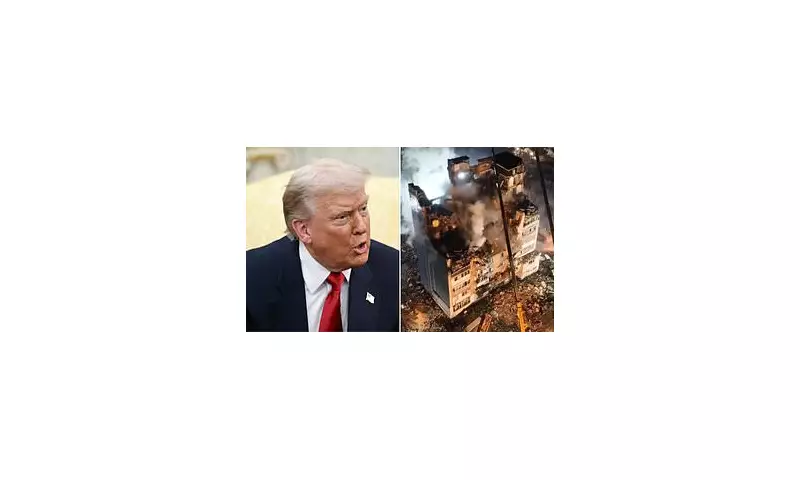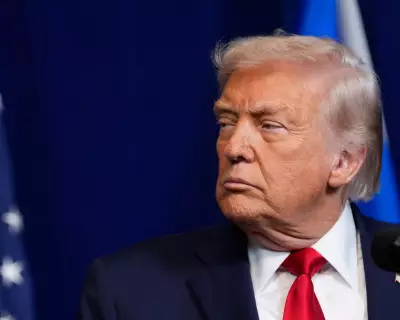
Trump Administration Presents Controversial Peace Proposal to Ukraine
Officials representing former President Donald Trump have arrived in Kyiv to pressure Ukrainian President Volodymyr Zelensky into accepting a sweeping 28-point peace agreement that multiple sources describe as heavily tilted towards Vladimir Putin. The proposal, which would fundamentally reshape Ukraine's sovereignty and defensive capabilities, comes amidst one of Russia's most intense bombardments since the full-scale invasion began in February 2022.
Key Demands That Would Reshape Ukraine
The draft agreement, secretly prepared by Russian and American officials while excluding Ukrainian representation, contains several provisions that would significantly weaken Kyiv's position. Most notably, Ukraine would be forced to cede the entire eastern Donbas region to Moscow while simultaneously reducing its military capacity by half.
According to sources familiar with the proposal, while Ukraine would retain legal ownership of the resource-rich eastern province, Moscow would gain de-facto control in exchange for an undisclosed rental fee. The industrial heartland, comprising Donetsk and Luhansk oblasts, contains substantial coal and mineral deposits that would fall under Russian administration.
The military restrictions prove equally draconian. Ukraine would be prohibited from possessing long-range missiles, barred from hosting foreign troops on its territory, and prevented from allowing diplomatic aircraft to land within the country. These measures would severely compromise Kyiv's ability to defend against future aggression.
Political and Cultural Concessions
Beyond territorial and military compromises, the proposal includes significant political concessions that would undermine Ukrainian sovereignty. Russian would be recognised as an official state language, while the local branch of the Russian Orthodox Church would gain official status in occupied territories.
One individual briefed on the plan told the Financial Times the proposal appears very comfortable for Putin, with another source describing it as heavily tilted toward the Russian leader. The timing appears strategic, coinciding with a corruption scandal engulfing Zelensky's administration that recently saw parliament dismiss the energy and justice ministers.
Escalating Violence Amid Diplomatic Pressure
The controversial proposal emerges against a backdrop of escalating violence. On November 20, 2025, Russia launched one of its most ferocious attacks to date, with 476 drones and 48 missiles striking civilian infrastructure across Ukraine.
The interior ministry reported that 25 people, including three children, were killed in Ternopil when Russian strikes destroyed apartment blocks. Approximately 80 others were wounded in the assault, which Kyiv sources condemned as war crimes.
Ukrainian forces face additional challenges beyond the diplomatic front. Roman Kostenko, secretary of the parliament's security committee, revealed that four out of five Ukrainians are fleeing military training centres after being drafted, highlighting a severe manpower crisis after nearly four years of conflict.
International Reaction and Uncertain Future
European leaders have expressed concern about the proposed agreement. EU foreign policy chief Kaja Kallas emphasised that any peace plan requires Ukrainian and European involvement to be effective. We haven't heard of any concessions on the Russian side, she told reporters in Brussels.
French foreign minister Jean-Noel Barrot insisted that peace cannot mean capitulation for Kyiv, while emphasising the need for discussions beginning with a ceasefire along contact lines.
The proposal was drafted by Trump's envoy Steve Witkoff and Kremlin adviser Kirill Dmitriev during a three-day meeting in Florida at the end of October. Witkoff subsequently conveyed the terms to Zelensky's national security adviser Rustem Umerov in Miami, making clear the expectation that Ukraine accept the conditions despite longstanding opposition to such concessions.
With Russian forces currently controlling approximately 19% of Ukrainian territory and continuing their advance, particularly around the strategically important city of Pokrovsk, Zelensky faces immense pressure from both military and diplomatic fronts as he considers a proposal that many in Kyiv would view as surrender.





